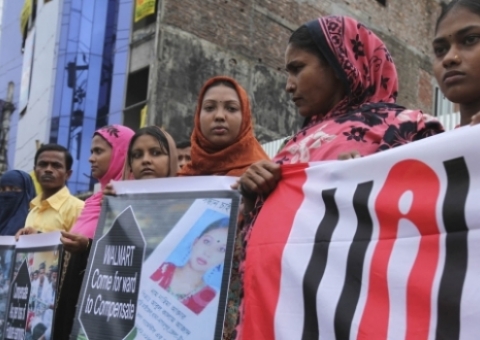Press
Global unions urge more brands to sign new Bangladesh Accord

Geneva, 9 October 2017—Global unions, IndustriALL and UNI, are demanding fashion brands sign up to the second Bangladesh Accord for Building and Fire Safety. The extension of the Bangladesh Accord is currently the only credible way to ensure that life-threatening hazards are identified and remediated in garment factories.
So far, almost 50 brands using 1,173 ready-made garment factories, have committed to signing the 2018 Accord with IndustriALL and UNI. The 2018 Accord extends the legally-binding commitment to factory safety in Bangladesh for three more years.
IndustriALL and UNI called on brands to sign the 2018 Accord by 7 October, the World Day for Decent Work, but many have failed to do so, showing their lack of commitment to staying the course to prevent another Rana Plaza tragedy.
A full list of the 46 signatory brands to the 2018 Accord can be found here, and a list of brands that have NOT signed the 2018 Accord is here.
Jenny Holdcroft, Assistant General Secretary of IndustriALL Gobal Union, said:
“The Accord has been a success improving safety at 1,800 garment factories, but until there is a reliable system of regulation in place in Bangladesh, we cannot be confident that all the good work of the past four years will not be undone.”
The first Bangladesh Accord, which expires next May, was launched in the wake of the Rana Plaza collapse in April 2013 that killed 1,134 workers and injured 2,500 more.
The 2018 Accord builds on the achievements of the first agreement. It also adds new worker protections and ensures that many more factories will be inspected and renovated, as signatory brands add suppliers.
UNI Deputy General Secretary, Christy Hoffman, said:
“It would be irresponsible to abandon the progress that the Accord has made. As two tragic incidents in recent months have shown, the Accord’s work must continue, and its scope should be broadened. Coming into the holiday season, that is the message we believe consumers will begin telling brands.”
The first Accord covers ready-made garment facilities, while the second agreement makes possible the inclusion of suppliers producing home textiles, yarn, cloth and other related products. A fire in a textile factory that killed six last month illustrates why this provision is important. After a boiler explosion in July killed ten and injured 50 at a garment factory, talks began to expand the scope of the Accord to include boiler safety.
Currently, the 2013 Accord covers 2.5 million workers in ready-made garment factories, and the Accord has completed fire and building safety inspections at 1,800 facilities which supply more than 200 signatory brands. Accord engineers have identified over 118,500 fire, electrical and structural hazards at these factories.
Nearly 80 per cent of workplace dangers discovered in the Accord’s original round of inspections have been remediated, and 500 Accord factories have completed 90 percent or more of the necessary fixes.
ENDS

